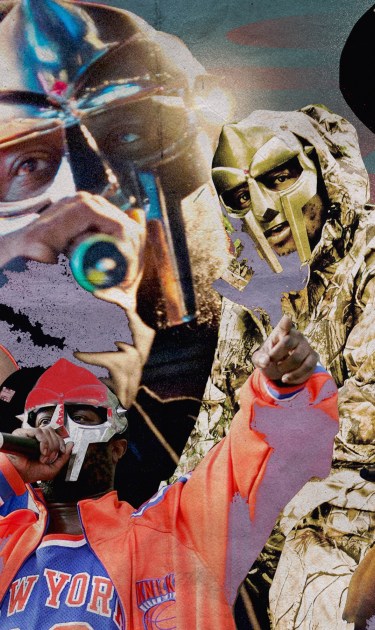Over two months after the sudden death of enigmatic rapper MF DOOM, his widow, Jasmine Dumile, posted the news on Instagram on New Year’s Eve. Comments were rife with shock as fans realized the 49-year-old died from unknown causes last Halloween. But, in good humor, DOOM’s cult following joked that the rapper would have likely preferred to depart on the symbolic holiday being that he dedicated his career to being a masked villain.
Before likening himself to armored Marvel anarchist Doctor Doom, MF DOOM’s early career started under the moniker Zev Love X as one-third of early ‘90s rap outfit KMD. While Zev Love X (born Daniel Dumile) was born in London, his family moved to Long Island shortly after his birth. KMD consisted of Onyx the Birthstone Kid and Dumile’s younger brother DJ Subroc.
Following the release of their debut album, Mr. Hood,in 1991, their rise to prominence took a nosedive in 1993 after Subroc was fatally struck while crossing the Long Island Expressway. Deep in mourning, KMD was dropped from their former label Elektra Records a week after Subroc’s death. Feeling duped by the music industry and on the verge of homelessness, Dumile went on a hiatus from 1994 to 1997, when he re-emerged as MF DOOM in New York City’s spoken word circuit.
MF DOOM solidified a loyal fanbase of diverse listeners around the world.
Prior to donning his signature gladiator mask, DOOM would wear pantyhose over his face while performing at open mic nights at Nuyorican Poets Café in Manhattan. It was at the Café that he performed his 1999 debut solo album Operation: Doomsday for the first time and, while DOOM was of Trinidadian and Zimbabwean heritage, he solidified a loyal fanbase of diverse listeners around the world—and especially in Latine communities—throughout his career.
Operation: Doomsday featured Puerto Rican and Cuban rapper Kurious, who DOOM would often collaborate with throughout his 30-year long career, last featured on “More Rhymin” from DOOM’s final solo album, Born Like This. The two were former members of the New York rap collective Monsta Island Czars, who only released one album, Escape from Monsta Island!, in 2003.
It was also Kurious who suggested that DOOM connect with DJ and radio host Bobbito Garcia—a member of the 80s hip-hop group Rock Steady Crew—to reintroduce himself in the rap circuit. Garcia and DOOM originally met in the early ‘90s, but it was then that DOOM segued back into music through Garcia’s boutique label Fondle ‘Em Records, which issued copies of DOOM singles and Operation: Doomsday.
Like Kurious, frequent DOOM collaborator Bronx-based rapper Chino XL memorialized his fallen friend on social media, referencing DOOM’s issues with reentering the United States after completing a European tour in 2010, and honoring his legacy as a “genius.”
You’ll never be forgotten, genius.
Hailing from the millennial generation of hip-hop, fellow Bronx rapper Wifisfuneral has a tattoo in the rapper’s metalface likeness. He also tweeted about DOOM, calling the rapper his “idol,” a sentiment shared by other DOOM fans.
DOOM’s unity with his Latine following was apparent through subtle nods in his music, like “Beef Rapp” from his 2004 album Mm..Food, where the rapper-producer sampled 1982 graffiti film Wild Style—a film in which the main protagonist was Zoro, played by Puerto Rican visual artist Lee Quiñones. Mm.. Food reacquainted DOOM with his ‘90s boom-bap inception and paid homage to historical Southern dishes through its salivating tracklist with songs like “Hoe Cakes” and “Gumbo.” Likening his hearty palette to verbally devouring subpar rappers, DOOM also titled songs like “Kon Carne” and “Kon Queso” after picante, chili-infused Mexican dishes.
While DOOM was regarded for his underground status as an elusive figurehead for the current lo-fi hip-hop generation, notable artists like Sango, Immortal Technique and more shared an outpour of grief and commemoration on social media over the past week:
For DOOM, commercial recognition and visibility were unwanted, but his cross-culture influence in hip-hop is infinite.




